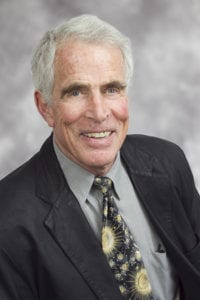
Peter Thigpen, a former Levi Strauss & Co. executive who taught business ethics to generations of Haas MBA students, passed away in Mill Valley on Nov. 5 after a short illness. He was 78.
Thigpen had taught “Ethics and Responsible Business Leadership” nearly every spring for the past 25 years, first in the full-time program and most recently in the evening & weekend program.
“He was deeply committed to imparting moral goodness on future generations of business leaders,” said Prof. Ernesto Dal Bó, one of several faculty who worked closely with Thigpen on the ethics course.
“He brought a unique perspective from decades as a successful business leader, teaching students how ethics was a crucial element of true leadership—and that business and ethics were complementary,” added Prof. Rui de Figueiredo. “His deep commitment to his students will leave a lasting imprint at Haas.”
Born Sept. 18, 1939 in Pasadena, Calif., Thigpen attended San Mateo High School and Stanford University, graduating in 1961 with a degree in economics. Driven by a deep belief in public service, he enlisted in the Marine Corps Officers program while at Stanford. He rose to the rank of 1st Lieutenant and worked as a radar intercept officer on F-4B fighter jets, catapulting on and off aircraft carriers. After being honorably discharged in 1964, he returned to Stanford to earn an MBA.
Levi Strauss success
Thigpen joined Levi Strauss in 1967, rising through the ranks to become president of the European division. Based in Brussels, he led the brand’s high growth in the region through the 1970s and early 1980s. In 1982, he was named president of Levi Strauss USA, and served in executive roles and on the board until he retired in 1991.
That “retirement” began a new chapter of his life, as an avid volunteer and board member with several organizations, an active family man, and a Haas School lecturer. Prof. Emeritus David Vogel met Thigpen through their mutual involvement in the Aspen Institute, where Thigpen served as a senior fellow and moderator. Beginning in 1992, they created and co-taught the ethics course for several years before it became part of the core curriculum and they each took on their own sections.
Teaching at Haas
“He was incredibly compassionate and cared deeply about the class,” Vogel said. “He told me he felt it was one of the most important things he could do—talking to future business leaders about ethics.”
Vogel was fond of teaching a case that featured Thigpen as a Levi’s Strauss executive facing a moral dilemma. The central question was how much Thigpen should tell a plant manager about a potential plant closing before it was officially announced. In the thick of the debate, Thigpen would walk into the room.
“It always caused an uproar. He would talk personally and passionately, and students were always inspired by his level of personal engagement,” Vogel said.
Prof. Ernesto Dal Bó used the same case and the same trick—but with Thigpen seated quietly in the room throughout the discussion, which usually included its share of critiques. Halfway through, Dal Bó would introduce him, and he’d stand up and give his take on the situation.
“One thing Pete would transmit within the first second was that he was a really good man having to resolve a really difficult situation, which would quickly bring the drama of the case to new heights,” Dal Bó said. “It was fun to watch someone who had such a successful career re-do the case in a very unassuming way—and allow inexperienced people to pass judgement on him. It was an exercise in humility, and a lesson in more ways than one.”
Both Dal Bó and Vogel said as soon as the course wrapped up each spring, Thigpen would reach out to talk about what to update or improve the next year. They’d compare notes and slides, and share good captions or videos or images.
“We all really loved Pete—he was such a gentleman, and was such a pleasure to work with,” said Dal Bó. “Even after all those years he would say ‘I’m coming here to do it better next time.'”
Dal Bó also taught Thigpen’s son Zach, now a 2nd-year student in the full-time MBA program. “He was incredibly proud of him,” he said.
Renaissance man
Described by his family as a Renaissance man, Thigpen was equally comfortable discussing existentialist philosophy as he was analyzing fantasy football; he was a lover of conversation, fine wine, classical music, and golf. He especially embodied the Haas Defining Leadership Principles of Students Always and Beyond Yourself.
“Believe in your heart of hearts that your fundamental purpose, your reason for being is to enlarge the lives of others, your life will be enlarged. And all the other things we have been taught to concentrate on will take care of themselves,” Thigpen was quoted in his obituary.
He is survived by his loving wife Shelly; brothers Steve and Jeff (Mary Ellen); sons Craig (Sarah), Eric, Chad (Althea) and Zach, grandchildren Lucas, Jacob, Camille, and Bryce; and five nieces and nephews.
In lieu of flowers, please honor Pete with donations to Reach Out & Read.